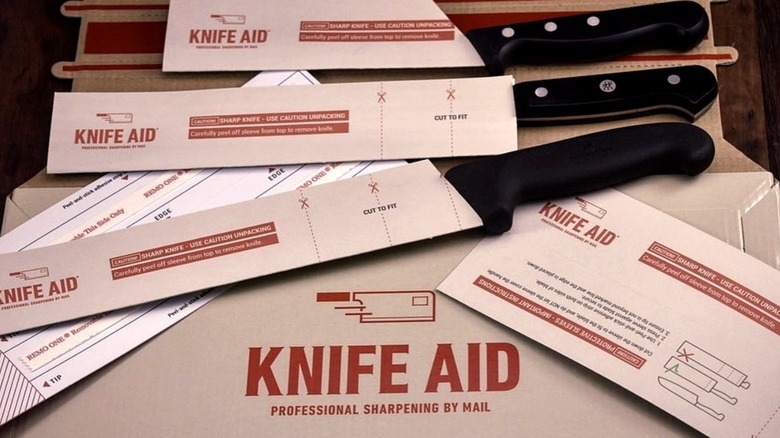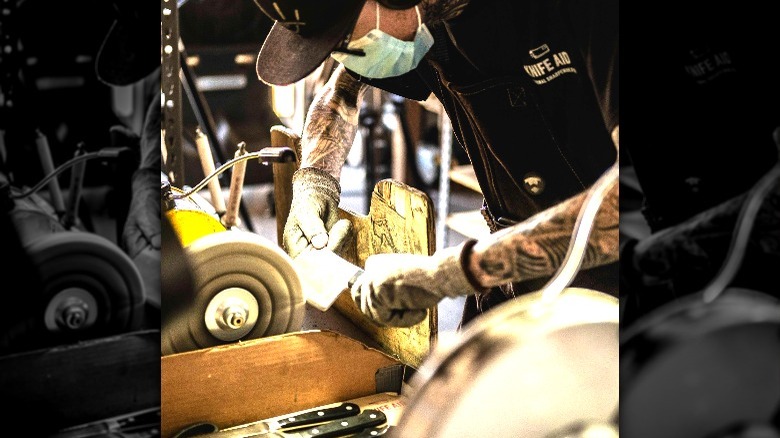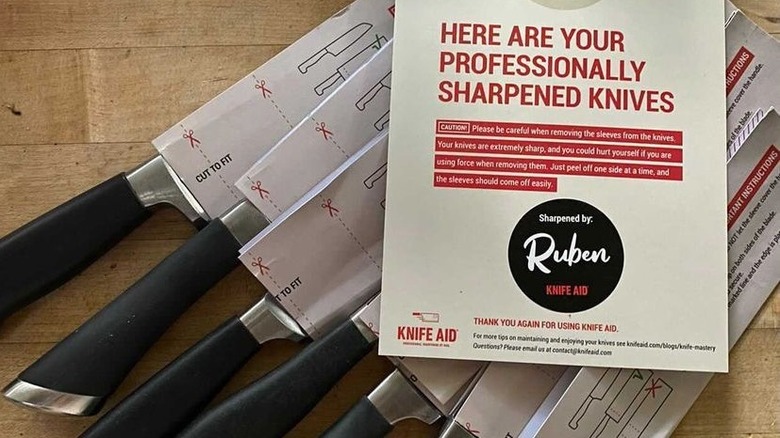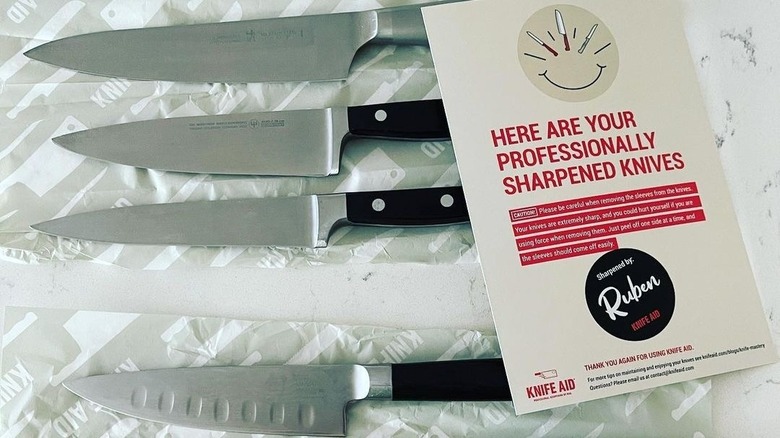What Happened To Knife Aid After Shark Tank?
Every entrepreneur has dreams of pitching their product to an investor on "Shark Tank." And while some of the best kitchen tools have come from the show, there have been plenty of rejections as well. Thankfully, the latter wasn't the case for the knife-sharpening brand Knife Aid.
When Mikael Soderlindh and Marc Lickfett appeared on Season 11, Episode 4 to pitch their idea (via YouTube), they probably didn't expect the sharks would actually follow them out the door to try and make a deal. The two businessmen sought a $400,000 investment for a 15% stake in the company. The concept? Knife sharpening made easy. Consumers would simply mail out their knives to Knife Aid, then Knife Aid would sharpen the knives and send them back — all within a week's time.
The sharks were practically begging to make a deal, and they even followed the two men out into the hallway to try and sell themselves even more. Eventually, Soderlindh and Lickfett agreed to a deal with sharks Lori Greiner and Rohan Oza for $500,000 and a 20% stake.
Knife Aid's cutting edge backstory
Starting Knife Aid was a labor of love for Mikael Soderlindh and Marc Lickfett, who moved their lives and families from Sweden to Malibu, California to start the business. "When the waves are right, we surf, and when the waves aren't right, [we] sharpen knives," Soderlindh told the Hitting the Mark podcast. When they started the company, Soderlindh was no novice to running a booming business, as he was the founder of the mega-successful clothing company Happy Socks. Soderlindh said the inspiration for Knife Aid came from a business-to-business idea where restaurants could send in their best chef's knives to be sharpened, but the idea shifted to a business-to-consumer concept. "...we know that there's a lot of home chefs. The trends are going that people want to start cooking at home. You cook exclusive ingredients and everything. It's like home cooking is just exploding in the organics and everything. And we know that people enjoy a sharp knife," Soderlindh said.
Given that Knife Aid is a mail-in sharpening service, they had to make few adjustments to their business with the COVID-19 pandemic, and, as home cooking exploded and restaurants still in operation needed sharp knives, they were lucky to become an essential business.
Knife Aid is still up and running
Since appearing on "Shark Tank" in 2019, Knife Aid has continued to build a business for itself. Customers can go to the website, where they are given the option to select to sharpen anywhere from four to 14 knives. Sharpening four knives will cost $59, while 14 will run you $149. According to Instagram, you can also participate in a knife sharpening subscription service.
The website goes beyond just a place for knife sharpening. Customers can also buy a Knife Aid gift card to give to their favorite chef, and there is a "knife mastery" section that offers instructions on typical knife uses, such as how to carve a turkey or how to cut corn off its cob.
The Knife Aid Instagram account has nearly 12,000 followers, though based on some internet research, it doesn't look like Knife Aid is currently available in retail stores. On the show, the sharks and entrepreneurs had theorized about making a deal with Williams Sonoma. However, it doesn't appear that has happened as of now, and looks like Knife Aid is an online-only business. Although, if you are in the Agoura Hills, California area, you can stop by Knife Aid's workshop for same-day sharpening at a discount (via Instagram).
Knife Aid has received mixed reviews
Though the brand appears to be doing well, as the Shark Tank Recap reports the brand has earned more than $250,000 per month at times, reviews of the business have been somewhat mixed. Even the best knife sharpeners still mean the consumer has to put in the work at home, which gives Knife Aid an advantage. However, Wired reports that the knife sharpening was "iffy" and that Knife Aid even admitted that the job for that reviewer was "not to our standards." However, for the price, it ultimately wasn't a bad deal.
On Amazon, the reviews were similarly mediocre, with the overall rating being 3.6 out of five stars. One user left a positive review, writing, "Excellent convenience service ... Very impressed with the quality." Someone else wasn't as pleased, giving the service one star and writing that the brand "destroyed" their serrated knives. Overall, the reviews generally seem average, but three years later, Knife Aid is still in business.
As for Mikael Soderlindh and Marc Lickfett, it seems as if they have now taken separate paths. According to LinkedIn, Soderlindh is no longer a shareholder in Knife Aid while Lickfett is currently the company CEO.



